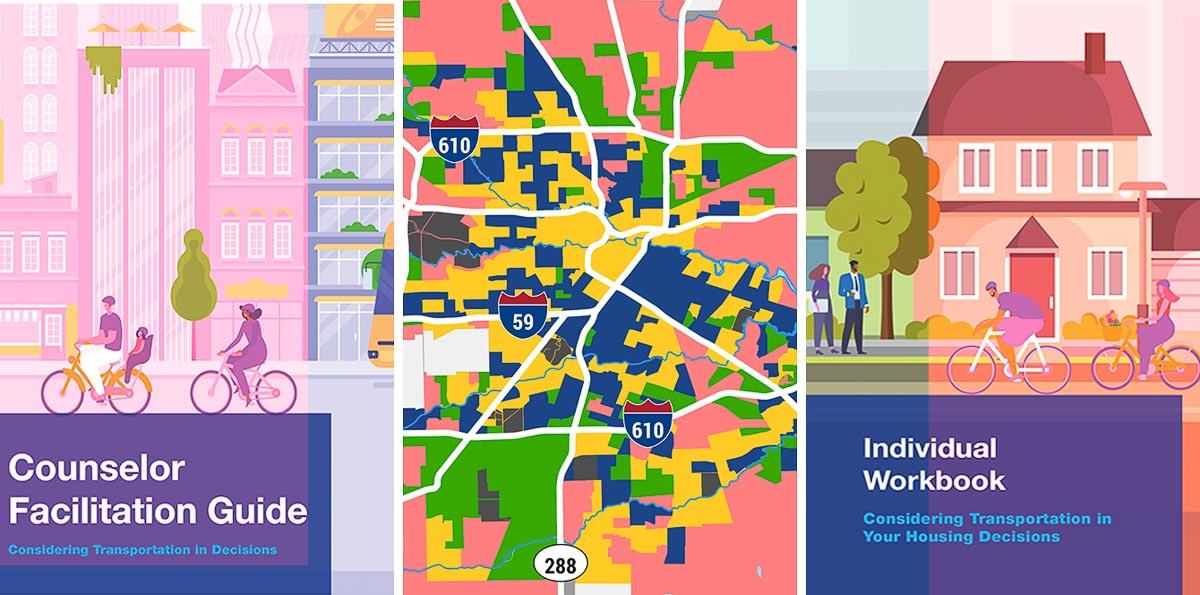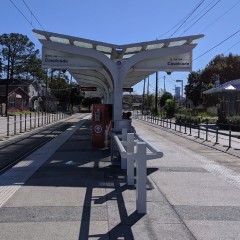To better understand this issue, LINK Houston and the Kinder Institute for Urban Research teamed up to explore where affordable housing and high-quality, affordable transportation co-exist in the Houston area. The results of that work were released Tuesday in the co-authored report, Where Affordable Housing and Transportation Meet in Houston. Read more about the housing and transportation landscape in the city and the researchers’ findings here.
This post provides a closer look at a number of tools in the report that policymakers, stakeholders and individuals can use to identify locations for affordable housing and transportation, as well as better understand how housing and transportation impact overall affordability in housing decisions.
Current policies too often result in gentrification and outward urban sprawl, pushing lower-income individuals and families farther away from opportunities — jobs, education, arts, culture and more. In addition, Houston’s car-dependency forces many who already are cost-burdened to spend too much on transportation, the cost of which often exceeds any savings gained from lower rent or mortgages.
Cost of housing plus transportation must be considered
The research and observations in the Where Affordable Housing and Transportation Meet in Houston report show only 44% of rental dwellings in Houston are affordable to households with moderate incomes (i.e., a family of four spending no more than $1,907 per month on housing plus utilities) and just 1 in 3 of those dwellings is located near quality, affordable transportation for people walking, biking and using transit.
To effectively address the affordability crisis in Houston, local decision-makers and individuals must consider the combined costs of housing and transportation and their impact on overall affordability. In addition to policy recommendations for aligning housing and transportation affordability, the report provides tools to help those making housing decisions to better understand that impact and finding where affordable housing and affordable, quality transportation exist in close proximity.
Tools developed to improve housing decisions
The research team co-developed the Quality Affordable Transportation Index (QATi) to help families and stakeholders understand where to look for better access to affordable transportation. The index combines seven indicators about sidewalks, bikeways and transit and serves as the basis for the Quality Affordable Transportation and Affordable Housing 2020 Map. Understanding the geographic intersection of housing and transportation will help the public and private sectors target investments, incentives and policies to preserve and develop affordable housing in locations that allow people to walk, bike and use transit, maximizing true affordability for residents.
Collaborative effort yields informative housing guides
As part of the study, LINK Houston formed the Affordable Housing + Transportation Task Force to collaborate with community members and housing and transportation stakeholders to create the Housing + Transportation Decision-maker Scorecard, the Counselor Facilitation Guide: Considering Transportation in Decisions and Individual Workbook: Considering Transportation in Your Housing Decision.
The Housing + Transportation Decision-maker Scorecard is a tool to measure access to high-quality affordable transportation — walking, biking and riding transit — from potential housing development sites as well as recommendations to improve affordable transportation options at existing affordable housing. Transportation connects people to opportunities outside of the home. The high cost of owning a vehicle and a lack of viable affordable transportation options near home can create a barrier to a high quality of life. As a result, many Houstonians expend more than what they can afford to reach work, grocery stores, schools or medical appointments. Ensuring quality walk, bike and transit options exist near affordable housing will reduce barriers to opportunities and enhance overall community well-being.
The Counselor Facilitation Guide: Considering Transportation in Decisions is a template for
Through the Individual Workbook: Considering Transportation in Your Housing Decision, a tool intended to complement the Counselor Facilitation Guide, individuals
LINK Houston co-developed the Scorecard and counseling tools through a series of workshops with the Affordable Housing + Transportation Task Force. The organization’s mission and work focus on meaningful community participation.
The report, along with the tools, is the result of an inclusive process to actively engage, critique and co-develop the resources with residents and organizational stakeholders. The Housing + Transportation Decision-maker Scorecard, the Counselor Facilitation Guide: Considering Transportation in Decisions, and the Individual Workbook: Considering Transportation in Your Housing Decision are mechanisms to change practice, shifting how Houston tackles the growing affordability challenge.
Housing and transportation policies need to be aligned
To ensure that housing is truly affordable and families can access opportunities, decision-makers must align affordable housing and transportation policies and investments. Local governments can use the QATi and Quality Affordable Transportation & Affordable Housing 2020 Map to start identifying locations where affordable housing and quality affordable transportation exist and work with private and nonprofit stakeholders to create more “Housed and Connected” areas — areas where affordable housing is available and connected to opportunities through affordable transportation options.
These entities should also educate individuals and families to consider location and transportation when deciding where to live. Truer affordability through housing and transportation will improve the quality of life and economic resilience for all Houston residents.
Ines Sigel is the director of communications and outreach for LINK Houston.


